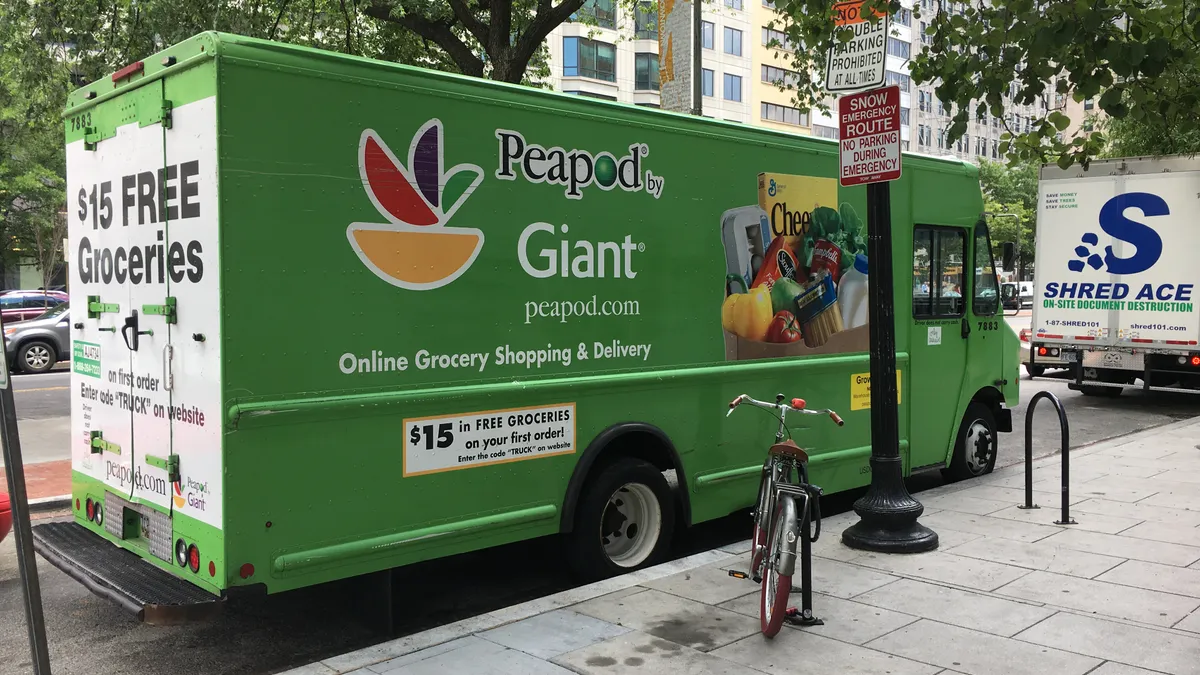In an exclusive interview with Food Dive, Ahold Delhaize CEO Dick Boer seemed to downplay the possibility that the grocery giant is contemplating a bid for beleaguered Kroger, which has been hit particularly hard by changing consumer buying habits and the recent $14.7 billion purchase of Whole Foods by online heavyweight Amazon.
Ahold Delhaize itself is the product of a 2016 merger that brought the Stop & Shop, Giant and Food Lion banners into the same company. The merger combined two big supermarket chains that together have more than 2,000 stores in the U.S., with many of those locations on the East Coast. The grocer is about halfway through integrating the two companies.
“We are just starting to integrate the companies here on the U.S. side. We have our hands full to work on what we have to do today,” Boer said about his company's interest in buying another grocer. “Today, we need to focus ourselves on delivering the synergies, the value out of this deal and that’s important for us.”
When pressed on whether he was looking for another acquisition, he chuckled: "If I would do it, I wouldn't tell it to you."
But Boer left the door open to another deal. “We, of course, are always looking around to see what is happening,” he said. "There is always speculation. I leave the speculation to the people who speculate."
The Cincinnati Business Courier reported earlier this month that Kroger may be in talks with Ahold Delhaize over a potential merger. The speculation stems from an analyst’s report that Ahold may have hired advisors to help explore a possible bid for Kroger. A tie-up between Ahold Delhaize and Kroger, owner of its namesake brand as well as grocers Harris Teeter and Ralphs, would give the combined company greater scale and buying power.
Traditional supermarket chains have been battered by the raft of competitive challenges posed by Walmart, discounters Aldi and Lidl, as well as Amazon-Whole Foods. This year alone, Kroger’s stock is down about 40% while Ahold Delhaize has declined 8%.
“The store itself will be an element of abundance and price and choice. I think that is difficult to do online in food."

Dick Boer
CEO, Ahold Delhaize
During the interview, Boer also downplayed the dire predictions that have cast a pall upon traditional brick-and-mortar grocers. While he didn’t discount the role that services such as online grocery and click-and-collect will play in delivering food to consumers going forward, the chief executive said supermarkets offer shoppers a slew of benefits not found in these other alternatives.
“I think it’s a little bit of an overreaction. Grocery stores have been there for a long period of time ... and they have a role to play,” Boer said. “The store itself will be an element of abundance and price and choice. I think that is difficult to do online in food.”
Brick-and-mortar stores have more quality, selection and freshness — factors that are especially valuable as the public increases its consumption of fresh, natural and organic food. In the case of Ahold Delhaize, the grocer offers a range of solutions that consumers can choose from, ranging from ready-to-eat prepared meals and home delivery in its Peapod unit to takeout food and ingredients that can be used at home.
“It’s still difficult to get online the smell, the taste … I think that’s important for a lot of customers at the end of the day,” Boer said. “There is also the relationship and the store and the people — don't forget that. How do you get community engagement online? You can’t.”
Pricing pressure continues to plague retailers despite recent reports that food deflation is showing signs of improvement — giving grocers the opportunity to pass on higher prices to consumers.
"It's an industry that is always about price. We always know that so we need some inflation back in the market."

Dick Boer
CEO, Ahold Delhaize
The U.S. Department of Agriculture expects supermarket prices to change between -0.25% and +0.75% in 2017. However, poultry, seafood and dairy prices are expected to rise this year compared with declines in 2016, according to the USDA.
“It's an industry that is always about price. We always know that so we need some inflation back in the market ... we see it now in the second quarter now coming back and that’s good news,” Boer said. “We have a bit more space to maneuver for everyone.”
Still, he said the discussion on price shows no sign of changing: "If you look at the promos, the campaigns everybody has — it's all about sales, sales, sales,"









